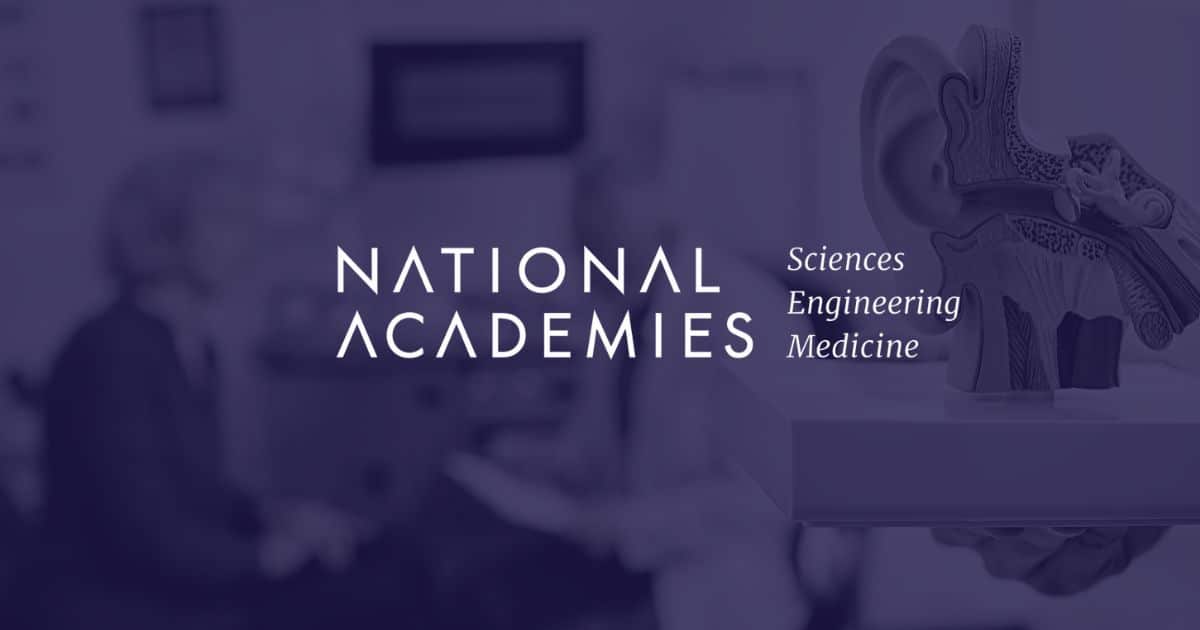WASHINGTON, D.C. — Earlier this month, the National Academies of Science, Engineering, and Medicine (NASEM) convened an open information-gathering session to launch a new committee focused on improving adult hearing healthcare. With an emphasis on meaningful measures, the committee seeks to define standard outcome measures, identify core outcome domains, and create a framework for developing standardized measures across diverse settings.
Their goal is to determine a core set of standardized outcome measures that are meaningful for patients and clinicians.
The committee’s statement of task indicates they will look at measures beyond communication, like quality of life, to develop a framework for implementing standardized metrics across different healthcare settings. The emphasis is on acquired adult hearing loss, particularly in older individuals.
The hope is that this work will ultimately enable better assessment of which interventions positively impact patients’ lives.
Better Assessing the Impact of Hearing Care
Representatives from sponsoring organizations, including the National Institute on Deafness and Other Communication Disorders (NIDCD), Centers for Disease Control and Prevention (CDC), and Veterans Health Administration (VHA), offered opening remarks at the session.
“Adult hearing healthcare lacks standard outcome measures that relate in meaningful ways to the individual’s perception of how they function and the impact hearing loss has on their quality of life.”
–Kelly King, AuD, PhD, National Institute on Deafness and Other Communication Disorders
Dr. Kelly King conveyed the sponsoring organizations sense of urgency in improving evidence-based hearing healthcare, given the rapid expansion of new interventions like pharmaceuticals and gene therapy. She emphasized that standardized, clinically meaningful outcome measures are critical for determining which current and emerging treatments help patients in tangible ways. This could drive future policy, regulation, reimbursement, and database contributions.
The sponsoring organizations have a collective goal for the committee to create recommendations that establish standardized outcome measures applicable across clinical, research, regulatory, and policy domains. Achieving this necessitates finding a balance between feasibility and scientific rigor to effectively evaluate interventions in adult hearing healthcare. There is an urgent public need to advance patient-centered hearing health, emphasizing the importance of cross-disciplinary collaboration.
A recording of the meeting, which took place on January 4, 2024, can be viewed below:
The following topics were discussed in the closed sessions
- Bias and Conflict of Interest
- Statement of task
- Working group topics
- Potential webinars
- Approach to literature review
Reference materials made available to committee include:
- Borre, E. D., et al. (2023). “The Impact of Hearing Loss and Its Treatment on Health-Related Quality of Life Utility: a Systematic Review with Meta-analysis.” J Gen Intern Med 38(2): 456-479.
- Giovannetti, E. R., et al. (2021). “Standardised approach to measuring goal-based outcomes among older disabled adults: results from a multisite pilot.” BMJ Quality & Safety 30(2): 157-166.
- Moberly, A.C., et al. (2023). “Expanding Real-World Outcomes in Adults with Hearing Loss.” from https://bulletin.entnet.org/clinical-patient-care/article/22873582/expanding-realworld-outcomes-in-adults-with-hearing-loss.
Source: NASEM






